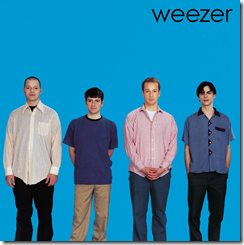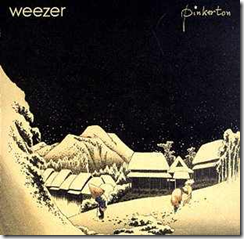Weezer's "Africa" is Toto's "Africa." I don't get it.
/You've probably heard Weezer's cover of Toto's song "Africa" at some point this summer. It's been the #1 song in America for the last three weeks and been on the charts for the last 12 weeks.
People love this song.
I don't get it.
I'm not opposed to musicians covering the songs of other musicians, and I'm not opposed to those covers becoming popular.
I'm a huge fan, for example of Joey Ramone's cover of Louis Armstrong's "What a Wonderful World." Rufus Wainwright's cover of Leonard Cohen's "Hallelujah." Aretha Franklin's cover of Otis Redding's "Respect."
Many, many more. The Beatles "Twist and Shout." Guns N' Roses "Live and Let Die" and "Knocking on Heaven's Door." Soft Cell's "Tainted Love." The Fugee's "Killing Me Softly." Johnny Cash's "Hurt."
But with each of these covers, the bands have changed the original version of the song in some fundamental way. Made it their own. Given the listener a new lens into something they thought they already knew.
Joey Ramone turns Louis Armstrong's classic slow song into high speed punk.
Rufus Wainwright takes a beautiful song that Leonard Cohen performed miserably and turns it into a classic (John Cale and Jeff Buckley probably deserve more credit for this than Rufus Wainwright, but I like Wainwright's version best).
Aretha changes the meaning of "Respect" completely by singing it from the position of a woman, leading Redding to famously say that Franklin "stole that song from me."
But Weezer's version of "Africa?" As far as I can tell, Weezer tried like hell to make their cover sound exactly like Toto's original song. In fact, when I first heard the new version, it took me a minute to realize that it wasn't Toto's original song, and my first thought upon realizing that it was different was "Did Toto release an anniversary version of the song?"
Why cover a song when you're simply reproducing the song as close as possible to it's original form? And this is Weezer. They are nothing like Toto. They could've done something really inventive and interesting and new with the song, but instead, they did nothing.
They took Toto's sheet music, played the song, and recorded it. They play it well, but they certainly don't make it their own.
And yes, the song went to #1 for three weeks. It's Weezer's biggest hit in a decade and their only chart topper. It's hard to argue with success.
Weezer will make a lot of money from this song. The success is impressive.
But when it comes to artistry? Musicianship? Originality?
Not so much. Weezer's version of "Africa" is fine, but I'll take Toto's version any day, because I prize artistry over mimicry. Originality over familiarity. Creativity over copying.

